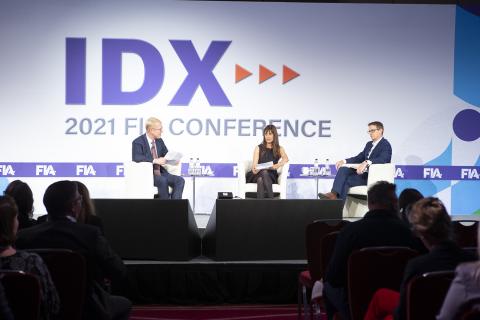Operational efficiencies were a key topic of discussion at the first day of the 2021 International Derivatives Expo in London on 27 September, with experts pointing to the need for automation and standardization to support both resilience and innovation in cleared derivatives markets.
In the wake of pandemic-related volatility in spring 2020, where record volumes created several post-trade challenges across cleared derivatives markets, the industry has been discussing areas where it might improve operational resilience through industry-led standardization. FIA has spearheaded that effort in part to address these concerns, but also to ensure the industry is well-positioned for continued growth and continued innovation in the years ahead.
Gary Saunders, an FIA board member and global head of prime derivatives services at Barclays, pointed to continued expansion for global derivatives volume thanks to trends like the rise of retail trading and the continued opening of China's financial markets. To properly facilitate the evolution of cleared derivatives markets, Saunders said, the industry must embrace shared standards that allows for "more volume through, for the same amount of effort."
In his opening remarks at IDX, FIA President and CEO Walt Lukken echoed this goal, noting that a focus on industry-led standards is the best way to "make our markets safer and reduce costs significantly for market participants."
Of course, that's easier said than done given the wide array of systems and data used by various market participants and service providers, said Alun Green, group executive at FIS, in an IDX panel on back office improvements.
"Automation and efficiency don't happen if different technology vendors or CCPs or FCMs all behave in different manners,” Green said on an IDX panel focused on potential operational improvements. “That includes their approach to things like data and file formats, but it also includes things like best practices for the industry, like when you send in your trade allocations."
Jonathan Morris, global head of listed derivatives operations at Goldman Sachs, added that while some progress has been made in discrete areas over recent years, it is important for the industry to take a comprehensive approach that spans front office, middle office and back office operations to ensure the "snowball is not getting bigger as it rolls down the stack."
"Historically, the industry has seemed to weight our operational resources largely towards the back office and reconciliation," Morris said. "But after the volatility in March 2020, it's clear that cannot be the only approach if we want to achieve standardization and efficiency."
Looking forward to how derivatives market participants might move towards standardization, Mike Thrower, vice president at Broadridge Financial Solutions, pointed out that FIA remains "a critical central point for the industry" and is the logical hub for these operational discussions and improvements. He noted FIA’s events like IDX that gather key stakeholders, as well as its respected standing among regulators and its deep relationships with firms across every step of the trade lifecycle.
"It's incumbent upon us all to engage in the collaborative work that FIA is leading to operate on a more efficient level," he said.
That collaborative work has only just begun, and will require industry stakeholders to put talent, energy and resources behind standardization efforts, said Joanna Davies, managing director and head of FX and securities at OSTTRA. That won’t always be easy, she admitted, but it’s necessary to seize future opportunities as well as to ensure that derivatives markets are not forced to deal with unwanted regulatory attention
"In many ways, we know about the operational issue we face, and these issues have gone on for many years," said Davies. "With COVID-related volatility in 2020, we saw those issues put some clearing brokers at risk and the problem has been put into sharp focus. It raises the concern that if we as an industry can't do something about it, a regulator may force the point on their own and implement a proposed solution that is not ideal."


